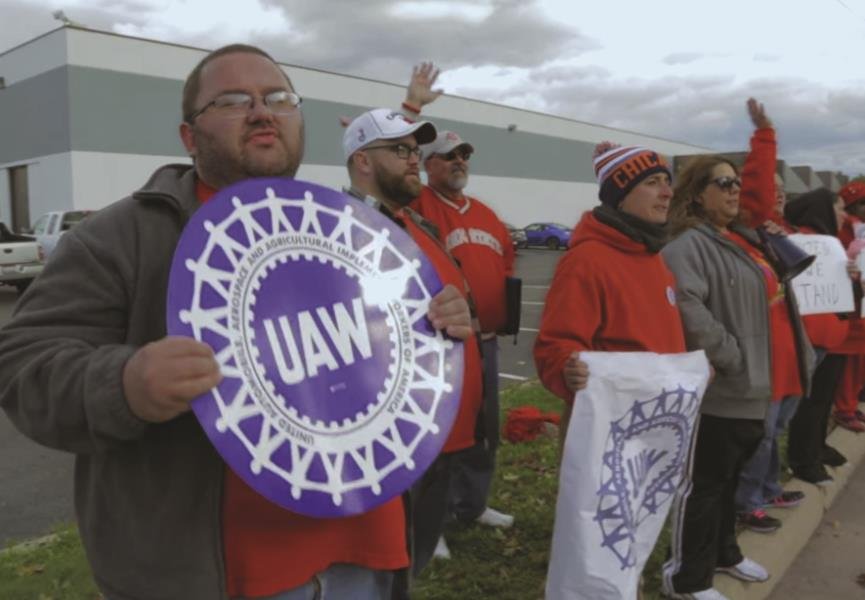The recent United Auto Workers (UAW) strike against the big three US automakers – Ford, General Motors, and Stellantis – has had a significant impact on the supply chain of the automotive industry. The strike, which lasted for nearly seven weeks, disrupted the production and delivery of vehicles and parts across the country. As a result, some automakers turned to air cargo services to keep their operations running and meet customer demand.
The UAW strike, which began on September 14, 2023, was the longest US auto strike in 25 years. It was the first time in its history that the UAW staged a simultaneous strike against the nation’s three unionized automakers. The strike involved more than 150,000 workers at 62 plants and warehouses.

The main issues that the union and the automakers were negotiating over included wages, health care, job security, profit sharing, and the use of temporary workers. The union also demanded that the automakers invest more in US plants and create more jobs for American workers.
The strike ended on October 30, 2023, after all three automakers reached tentative agreements with the UAW. Ford was the first to announce its deal, followed by Stellantis and GM. The agreements included higher wages, better health care benefits, larger bonuses, and more investment in US facilities.
The impact of the strike on the automotive supply chain
The strike, however, had a huge impact on the automotive supply chain, as it disrupted the production and delivery of vehicles and parts across the country. According to the Anderson Economic Group, the first five weeks of the strike had an economic impact of $9.3 billion. The production losses likely cost the automakers billions of dollars as well.
The strike also affected the suppliers, dealers, and customers of the automakers. Many suppliers had to lay off workers, reduce hours, or shut down operations due to the lack of orders from the automakers. Some dealers faced inventory shortages and delayed deliveries of new vehicles. Some customers had to wait longer for their orders or switch to other brands.
The role of air cargo in mitigating the supply chain disruption
To mitigate the supply chain disruption caused by the strike, some automakers turned to air cargo services to transport vehicles and parts to their destinations. Air cargo is faster and more reliable than other modes of transportation, especially in times of crisis. However, it is also more expensive and less environmentally friendly.
According to The Loadstar, a logistics news website, US operator Ascent Global Logistics had a busy October and November, as it saw a surge in demand for its air cargo services from the automotive industry. The company operates a fleet of 15 Boeing 737 freighters and provides scheduled and charter services to various destinations in the US, Canada, and Mexico.
Ascent Global Logistics said that it had transported vehicles and parts for several automakers, including Ford, GM, Stellantis, BMW, and Tesla. The company said that it had flown more than 100 charter flights for the automotive industry in October and November, compared to an average of 20 to 30 flights per month before the strike.
The company also said that it had increased its scheduled flights to Mexico, where many automakers have plants and suppliers. The company said that it had flown more than 200 scheduled flights to Mexico in October and November, compared to an average of 150 flights per month before the strike.
Other air cargo operators also benefited from the increased demand from the automotive industry. For example, Air Canada said that it had seen a spike in its cargo revenue in the third quarter of 2023, partly due to the UAW strike. The airline said that it had transported vehicles and parts for several automakers, including Ford, GM, and Stellantis, from Canada to the US and Mexico.
Another example is USA Jet, a subsidiary of Active Aero Group, which provides on-demand charter services for the automotive industry. The company said that it had flown more than 50 charter flights for the automotive industry in October and November, compared to an average of 10 to 15 flights per month before the strike.
The future of air cargo for the automotive industry
The UAW strike has shown the importance of air cargo for the automotive industry, as it can provide a fast and flexible solution to overcome supply chain challenges. However, air cargo also has its limitations, such as high costs, limited capacity, and environmental impact.
Therefore, the automotive industry may need to find a balance between using air cargo and other modes of transportation, depending on the situation and the demand. The automotive industry may also need to invest more in improving its supply chain resilience and efficiency, such as by diversifying its sources, optimizing its inventory, and adopting new technologies.
Air cargo, however, will likely remain a vital part of the automotive supply chain, especially as the industry shifts to more electric and autonomous vehicles, which may require more specialized and sensitive parts. Air cargo may also play a key role in supporting the near-shoring trend, as some automakers may relocate their production closer to their markets to reduce costs and risks.
